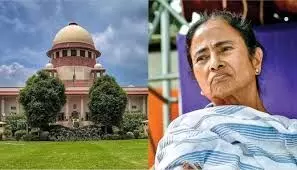West Bengal Government Employees Win Battle as Supreme Court Orders 25% DA Hike

After a prolonged legal and bureaucratic battle spanning years, the Supreme Court of India has delivered a landmark ruling in favour of West Bengal government employees, directing the state government to pay 25% Dearness Allowance (DA) within a period of three months. The decision, which has been postponed a staggering 18 times, marks a critical victory for thousands of public sector workers who have been campaigning for parity with their central government counterparts.
The court’s interim order, issued by a division bench comprising Justices Sanjay Karol and Sandeep Mehta, brings much-needed clarity and relief in a dispute that originated in the Calcutta High Court and eventually reached the apex court. The matter is scheduled for further hearing in August, but the direction to disburse 25% DA has been made mandatory, ending a prolonged phase of uncertainty.
The genesis of the conflict dates back several years when a section of West Bengal government employees filed a petition in the Calcutta High Court demanding DA parity with central government employees. At the time, central employees were receiving substantially higher DA percentages as part of their cost-of-living adjustment benefits. While the West Bengal government did hike the DA intermittently, the state employees remained behind by a margin of 37 percentage points — a gap that has become emblematic of the broader issues plaguing public service remuneration in the state.
The situation was exacerbated by the repeated adjournments of the hearing — 18 times in total — which not only delayed justice but also added to the frustration and financial distress of thousands of employees. "This has been a struggle of more than six years. Every time we hoped for justice, the hearing would get pushed. The Supreme Court’s decision today is a ray of hope," said Debashis Dutta, spokesperson of the Coordination Committee of State Government Employees, a major body representing public servants in West Bengal.
The Coordination Committee and other employee unions have consistently argued that withholding DA in such disproportionate terms amounts to a violation of the principle of equal pay for equal work. "DA is not a luxury. It is a compensation for inflation. The wide gap between state and central employees has caused tremendous hardship," added Dutta.
From an economic perspective, the state government has cited fiscal constraints as the primary reason for its inability to match the central DA rates. West Bengal has been grappling with a significant debt burden, which as of 2023-24 stood at approximately ₹6.8 lakh crore. Nearly 20% of its annual budget goes towards servicing this debt, leaving relatively little fiscal space for discretionary spending.
The state has also pointed out that unlike the Centre, it does not have the same revenue-generating mechanisms or access to monetary tools such as printing currency or adjusting monetary policy levers. A senior official from the finance department, speaking on condition of anonymity, stated, “The state's revenue from GST compensation has shrunk post-2022. Our own tax collections are just beginning to recover after the pandemic. Meeting such a large DA liability in a lump sum is a challenging task.”
However, critics argue that while the state’s fiscal health is indeed under pressure, it is a matter of priority rather than capacity. “If the government can find resources for populist schemes and political rallies, then surely it can pay its employees what they are rightfully owed,” said economist Dr. Arindam Banerjee of Jadavpur University. According to him, fulfilling the DA obligation will stimulate local economies as public employees are likely to spend the extra income on goods and services.
Estimates suggest that the 25% DA hike would cost the state exchequer around ₹7,000-₹8,000 crore annually. While this is a significant amount, it is not insurmountable when viewed against the state’s total expenditure budget of over ₹3.5 lakh crore. Moreover, spreading the burden across multiple quarters or linking it to incremental revenue collection targets could provide a fiscally responsible path forward.
From a legal standpoint, the Supreme Court’s directive also reinforces the notion that DA is a legally enforceable right and not merely an administrative grace. "This ruling is a strong precedent that validates the rightful claims of government employees. It clearly shows that deferring legitimate entitlements citing administrative or financial reasons will no longer be tolerated by the judiciary," said senior advocate Ananya Sen, who has been following the case closely.
In the political arena, reactions have been mixed. While opposition parties have hailed the judgment as a victory for workers, ruling party leaders have remained largely silent, possibly awaiting the finance department’s action plan to comply with the court’s order.
For thousands of employees, the ruling is not just about numbers — it is about recognition, respect, and relief. Many have struggled with rising inflation, school fees, healthcare costs, and daily living expenses, all while watching their peers in central services receive timely revisions. "We have been made to feel like second-class citizens in our own state. Today’s judgment restores a sense of dignity," said Meena Das, a government school teacher in Hooghly.
As the August hearing approaches, attention will now shift to whether the West Bengal government complies fully and on time. But for now, the Supreme Court has delivered a powerful message: justice delayed does not always have to mean justice denied.
